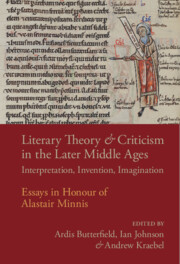Book contents
- Literary Theory and Criticism in the Later Middle Ages
- Literary Theory and Criticism in the Later Middle Ages
- Copyright page
- Contents
- Figures
- Contributors
- Preface and Acknowledgements
- Abbreviations and Conventions
- The Career and Contributions of Alastair Minnis
- Introduction
- Chapter 1 Access through Accessus
- Chapter 2 Scholastic Theory and Vernacular Knowledge
- Chapter 3 Poetics and Biblical Hermeneutics in the Thirteenth Century
- Chapter 4 Robert Holcot and De vetula
- Chapter 5 The Inspired Commentator
- Chapter 6 Guitar Lessons at Blackfriars
- Chapter 7 The Re-cognition of Doctrinal Discourse and Scholastic Literary Theory
- Chapter 8 Arts of Love and Justice
- Chapter 9 The Many Sides of Personification
- Chapter 10 Encountering Vision
- Chapter 11 George Colvile’s Translation of the Consolation of Philosophy
- Chapter 12 When Did the Emotions Become Political?
- Bibliography of the Works of Alastair Minnis
- Bibliography
- Index
- References
Bibliography
Published online by Cambridge University Press: 20 April 2023
- Literary Theory and Criticism in the Later Middle Ages
- Literary Theory and Criticism in the Later Middle Ages
- Copyright page
- Contents
- Figures
- Contributors
- Preface and Acknowledgements
- Abbreviations and Conventions
- The Career and Contributions of Alastair Minnis
- Introduction
- Chapter 1 Access through Accessus
- Chapter 2 Scholastic Theory and Vernacular Knowledge
- Chapter 3 Poetics and Biblical Hermeneutics in the Thirteenth Century
- Chapter 4 Robert Holcot and De vetula
- Chapter 5 The Inspired Commentator
- Chapter 6 Guitar Lessons at Blackfriars
- Chapter 7 The Re-cognition of Doctrinal Discourse and Scholastic Literary Theory
- Chapter 8 Arts of Love and Justice
- Chapter 9 The Many Sides of Personification
- Chapter 10 Encountering Vision
- Chapter 11 George Colvile’s Translation of the Consolation of Philosophy
- Chapter 12 When Did the Emotions Become Political?
- Bibliography of the Works of Alastair Minnis
- Bibliography
- Index
- References
Summary

- Type
- Chapter
- Information
- Literary Theory and Criticism in the Later Middle AgesInterpretation, Invention, Imagination, pp. 286 - 315Publisher: Cambridge University PressPrint publication year: 2023



